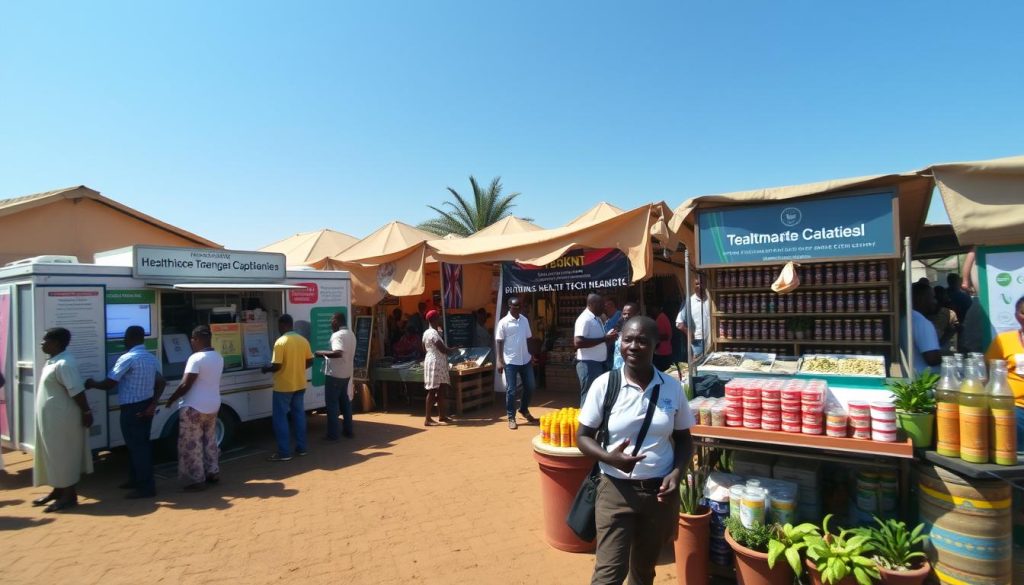The Africa healthcare sector is at a critical juncture. It urgently needs new healthcare business ideas to tackle existing problems. Quality healthcare is still a big challenge in many parts of the continent.
Sustainable healthcare solutions are key to better health outcomes. Medical startups are crucial in bringing health technology to Africa. They drive innovation and attract investment, improving healthcare services.
The Current State of Healthcare in Africa
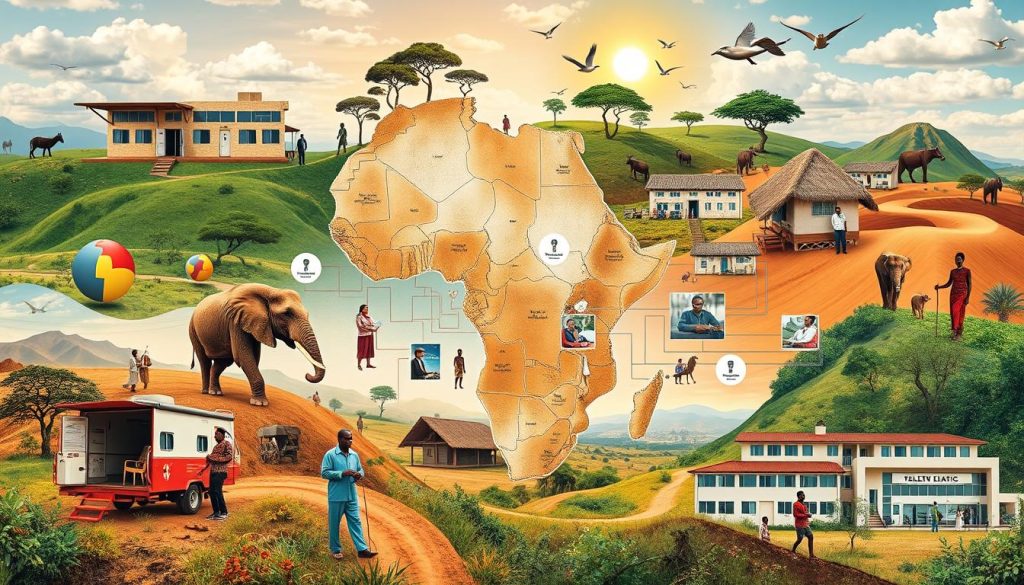
The healthcare in Africa is complex, with both challenges and opportunities. There’s a big gap between urban and rural healthcare. Urban areas have better facilities and more doctors, while rural areas lack these resources.
This difference leads to different health outcomes in different places. It shows how important it is to improve Africa’s healthcare systems.
Healthcare statistics in Africa show many health problems. These include diseases, malnutrition, and not enough clean water. The African Development Bank says better healthcare infrastructure is key to solving these issues.
Improving healthcare can greatly improve people’s lives. It’s crucial for the well-being of millions.
Government policies and investments are vital to improve healthcare. They need to focus on better medical training, more services, and using technology. This will help Africa achieve universal health coverage.
Ensuring everyone has equal access to healthcare is essential. It’s the best way to tackle health challenges across the continent.
Understanding Healthcare Challenges on the Continent
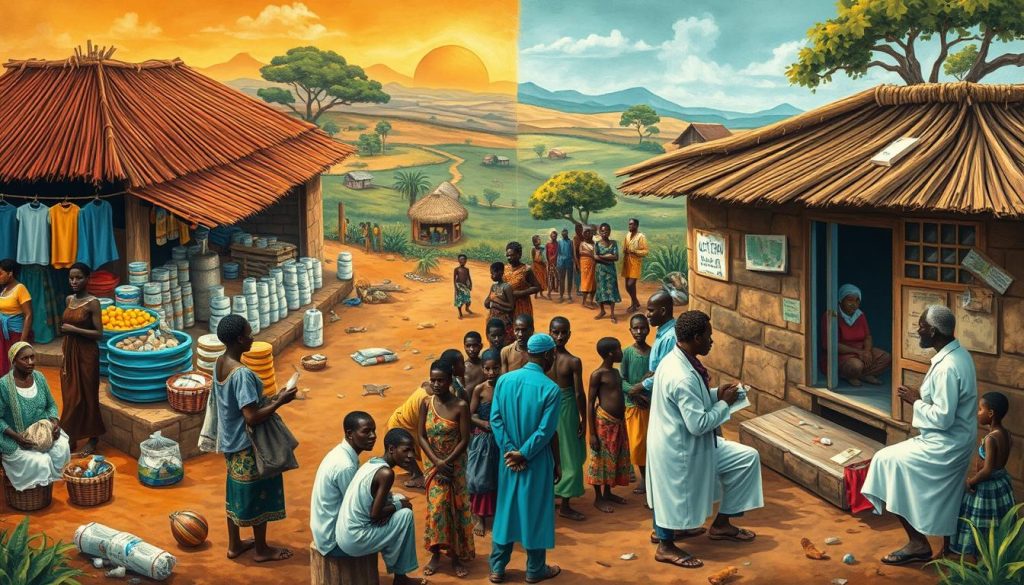
Africa faces huge healthcare challenges. A big problem is the high number of diseases like HIV/AIDS, tuberculosis, and malaria. These diseases put a lot of pressure on health services, leading to health crises.
Getting enough money for healthcare is a big issue. Many countries don’t have enough money. This means they can’t build good hospitals, buy medicines, or improve services. Managing money well is key to solving these problems.
Getting to healthcare services is hard for many. People in rural areas often have little access. Even in cities, too many people can mean long waits and poor care. This makes health care unfair, especially for the most vulnerable.
Beliefs and stigma also block people from getting help. If people don’t think they should get care, they won’t. Making healthcare fit the local culture can help more people get the care they need.
Innovative Technologies Transforming Healthcare Delivery
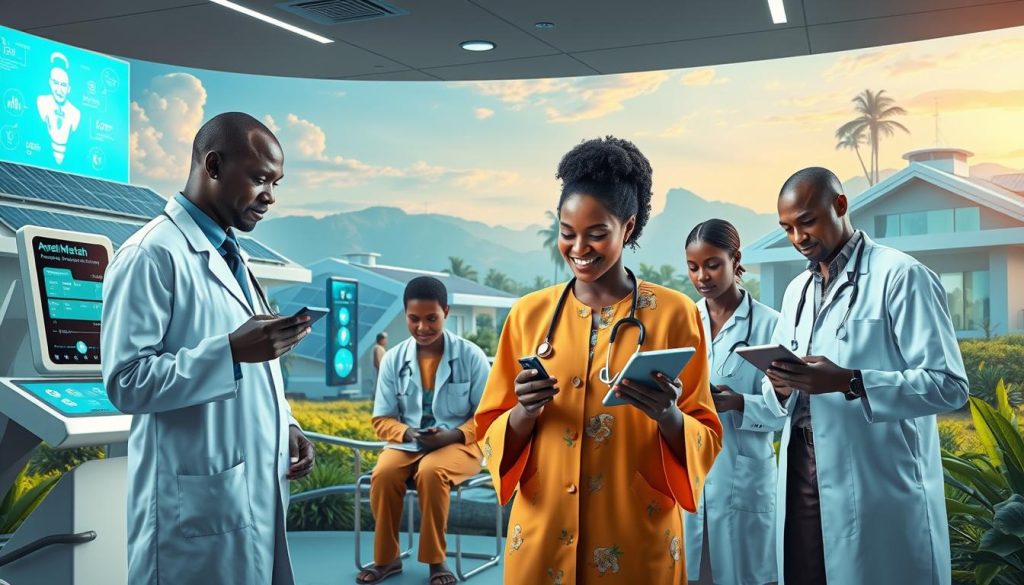
The way healthcare is delivered in Africa is changing fast. New health technology solutions are making services better and more available. Digital health platforms are key, helping doctors reach patients in far-off places.
Mobile health apps are also making a big difference. They let people check their health and get advice on their phones. This makes it easier for patients to stay in touch with their doctors.
Digital health records are making patient care even better. They help doctors access important patient information quickly. This leads to better health outcomes for everyone, showing how far healthcare has come in Africa.
Healthcare Business Ideas in Africa
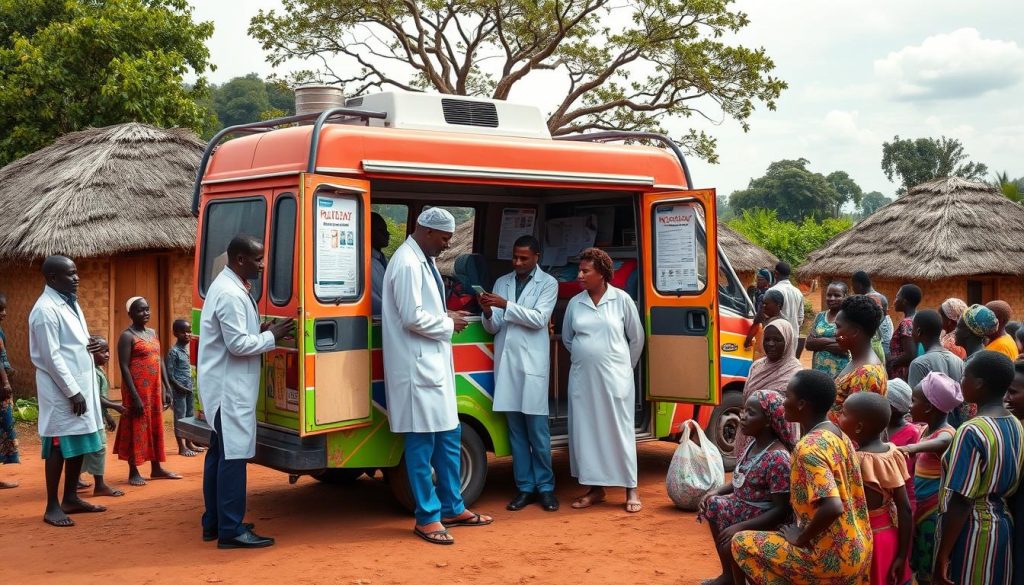
Africa’s healthcare scene is full of chances for new ideas. Telemedicine and mobile health clinics can help solve the problem of getting to doctors. They make sure everyone can get the medical help they need.
Telemedicine Solutions to Bridge the Gap
Telemedicine is changing healthcare in Africa. It lets people talk to doctors online, without having to travel. This is especially helpful in rural areas where it’s hard to get to hospitals. The main benefits are:
- Improved patient access to specialists
- Reduced travel costs for patients
- Convenient follow-up consultations
Starting a healthcare business in telemedicine is exciting. New platforms are being made to fit the needs of Africans, offering better healthcare experiences.
Mobile Health Clinics for Rural Outreach
Mobile health clinics are key for rural areas. They bring essential healthcare services right to the people. The advantages are:
- Accessibility to preventative and primary care
- Immediate onsite treatment for minor ailments
- Enhanced community engagement in health education
Starting a business with mobile health clinics shows the power of new ideas. They help meet patients’ needs and improve health in hard-to-reach places.
Pharmaceutical Innovations and Their Impact
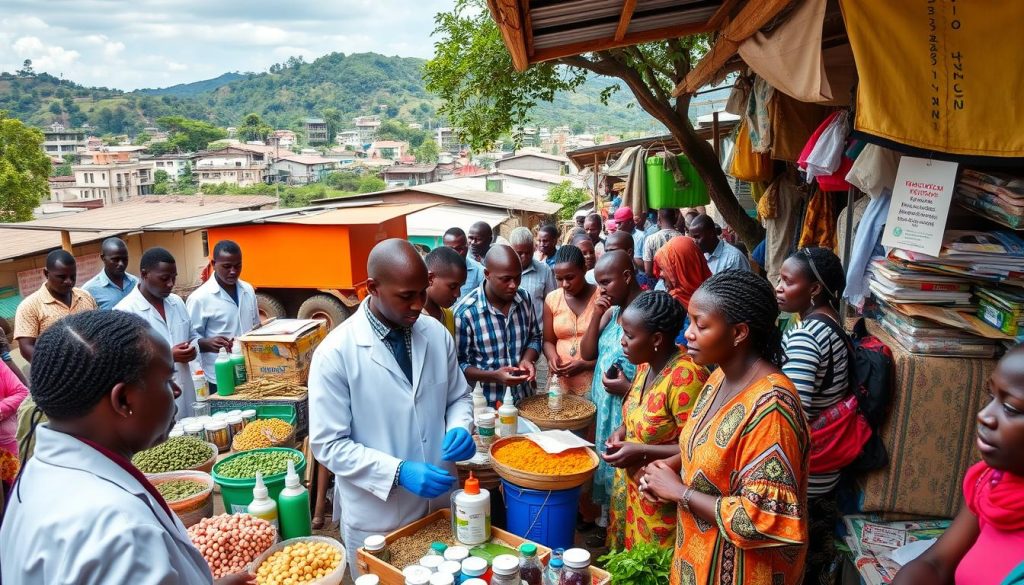
Pharmaceutical innovations are changing healthcare in Africa. They tackle long-standing issues of access and cost. The focus on local medicine production is key to making healthcare sustainable.
By making their own medicines, countries can improve their healthcare systems. This reduces their reliance on imported drugs.
Local Production of Medicines
Local medicine production is vital for Africa’s self-sufficiency in drugs. It boosts local industries, creating jobs and stabilising the economy. The main advantages are:
- Lower medicine costs due to fewer import fees.
- More medicines available, especially in hard-to-reach places.
- Better quality control through local production.
Supporting local production is part of a bigger effort to improve healthcare in Africa. It helps make medicines more accessible to people.
Online Pharmacies and E-prescriptions
Online pharmacies and e-prescriptions are changing how we get medicines. These technologies make getting drugs easier and help people stick to their treatment plans. The main points are:
- Ordering medicines from home is convenient.
- Clearer prices help patients make better choices.
- Prescription management is more efficient, ensuring timely refills and reminders.
Online pharmacies and e-prescriptions are key to Africa’s drug innovation. They make healthcare resources more accessible to everyone.
Health Insurance Models Tailored for African Markets
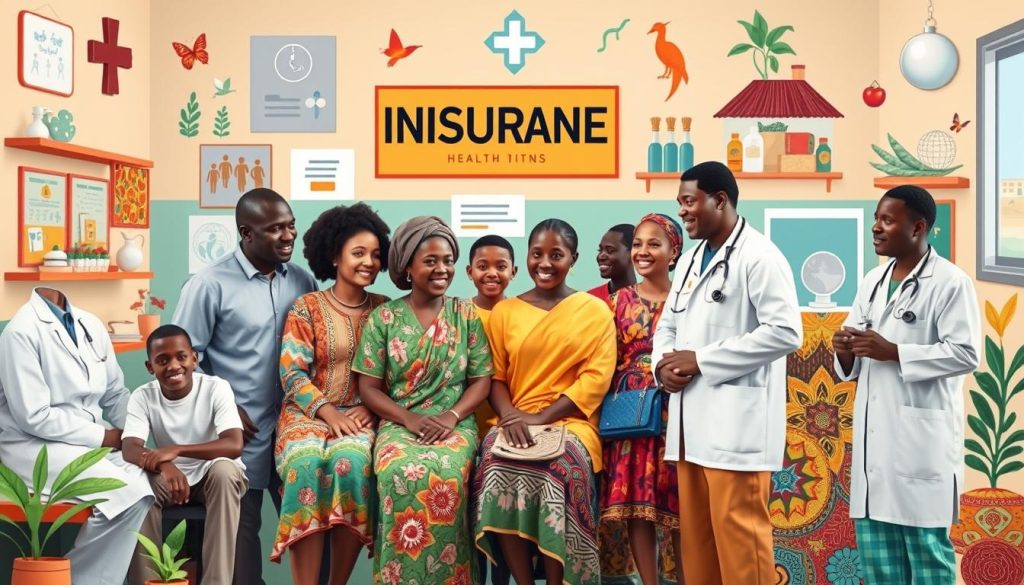
The health insurance scene in Africa is changing fast. It’s all about finding ways to pay for healthcare that work for everyone. Old insurance plans don’t always fit the needs of African countries. So, new health insurance models are being made just for Africa.
Micro-insurance is becoming more popular. It’s cheap and helps people who can’t afford regular insurance. It helps families and improves health in poor areas.
Looking at different insurance plans, we see both problems and chances. Not enough people know about health insurance, and rules can change a lot. But, working together can help. Governments, private companies, and charities can make insurance more known and right for each area.
- Development of community-based insurance initiatives
- Integration of digital technologies for accessibility
- Innovative pricing strategies to encourage participation
These steps are key to making health insurance work better in Africa. Knowing about different plans is crucial for making a real difference in healthcare.
Next-Generation Diagnostics and Testing Services
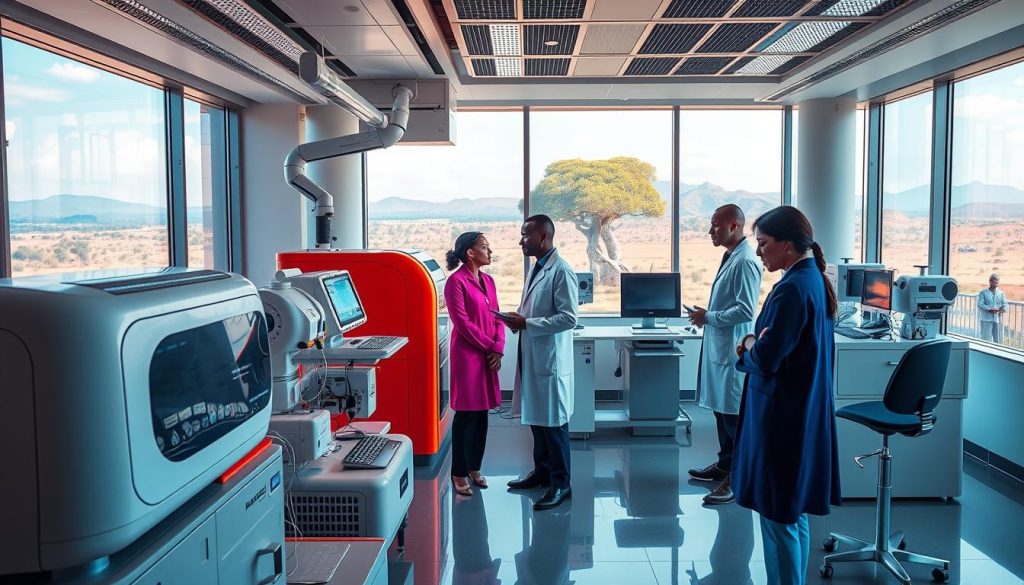
Healthcare in Africa has seen big changes thanks to new diagnostics. Testing services now work faster and more accurately. This is especially important in rural areas where getting to hospitals can be hard.
Point-of-care testing is leading this change. It gives quick and reliable results. This helps doctors make treatment plans fast.
Point-of-care Testing Technologies
Point-of-care testing lets doctors do tests right where patients are. It’s key in Africa because getting to labs can be tough. The main benefits are:
- Quick results help doctors make better choices.
- It’s used in remote areas to make healthcare more accessible.
- It cuts down on waiting times, making patients happier.
Community Health Worker Training for Diagnostics
Training community health workers makes diagnostics even better. They connect healthcare to people who need it most. They learn how to use point-of-care testing and understand results. They also learn to talk to patients about their health.
- They learn how to use point-of-care testing.
- They understand what the results mean.
- They know how to talk to patients about their health.
Healthcare Education and Training Opportunities
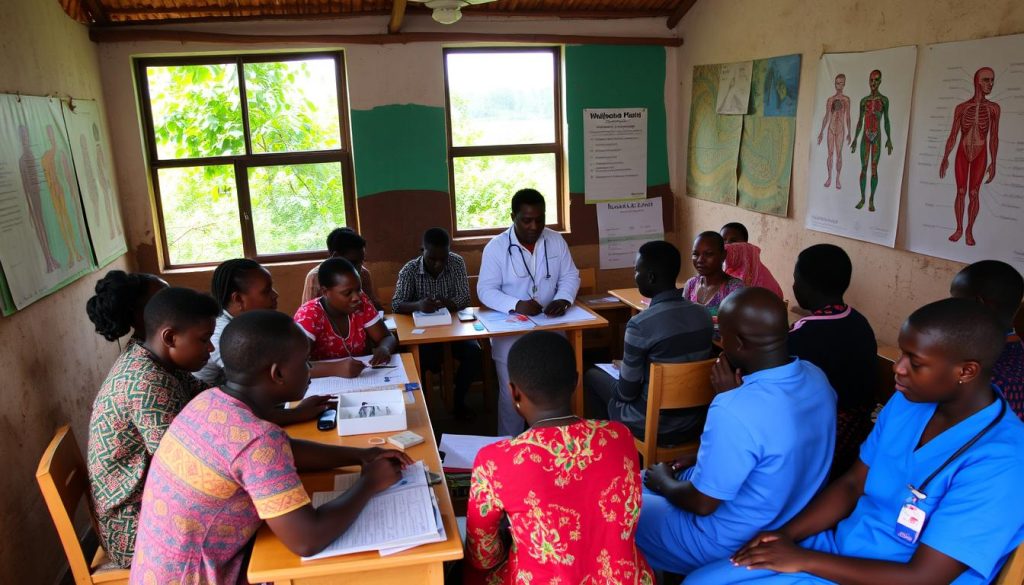
The world of healthcare education in Africa is changing fast. This is thanks to new technology. Online learning and tele-education are key for improving healthcare skills across the continent. They aim to fill the skills gap in healthcare.
Online Courses and Tele-education Platforms
Many initiatives are helping to educate future healthcare workers. They offer a variety of subjects to help professionals learn. Here are some examples:
- Universities and online platforms are working together. They provide accredited courses, making training more credible.
- Tele-education lets people learn from home. This helps those in rural areas get knowledge without traveling far.
- Online modules make learning fun and interactive. They help health professionals get better at their jobs.
Thanks to new online learning, healthcare education in Africa is getting better. It’s making health care better for everyone on the continent.
Nutrition and Health Food Startups
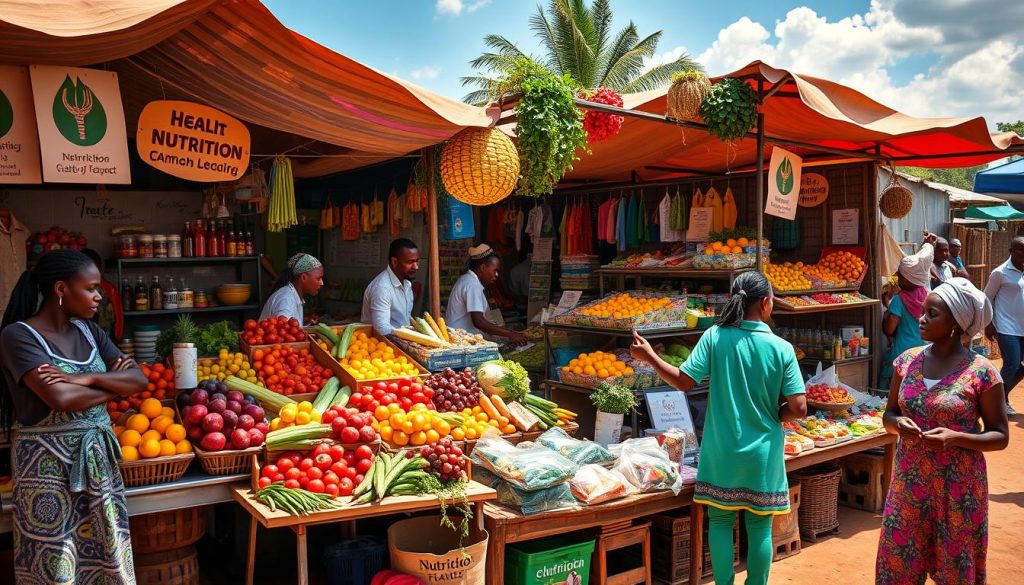
The rise of nutrition startups in Africa has changed how people eat across the continent. These companies focus on healthy food, using local resources to improve food security. They help improve health and boost local economies by promoting community nutrition.
Community-based Nutritional Initiatives
Community-based nutritional initiatives bring together local farmers, artisans, and health advocates. They highlight the value of traditional foods, teaching people about their health benefits. Key aspects include:
- Using local crops to increase nutritional value.
- Workshops to improve cooking skills.
- Spreading the word about the importance of a balanced diet.
- Supporting small farmers through local markets.
These efforts show how nutrition startups in Africa can help food security and promote healthier living. They meet local needs, using what’s available, leading to sustainable growth and development.
Integrating Traditional Medicine with Modern Practices

Combining traditional medicine in Africa with modern healthcare is a great chance to improve patient care. Traditional medicine in Africa includes many practices and beliefs passed down through generations. When we mix these with modern health care, we get better health results and happier patients.
Healthcare providers can meet the needs of different patients by using traditional healing methods. These methods often include herbal remedies, spiritual treatments, and lifestyle changes that fit local cultures. This approach helps build trust and makes patients more likely to follow medical advice.
The benefits of mixing traditional medicine with modern practices are many:
- Patients feel more involved in their care because treatments fit their culture.
- There are more ways to treat long-term illnesses, using both natural remedies and medicines.
- Health care becomes more accessible in remote areas.
- Health systems get stronger by offering more treatment options.
Healthcare providers who use integrative health approaches can make their work better. Working together, traditional healers and modern doctors can create effective care plans. These plans respect and value local traditions.
Digital Health Records: Streamlining Patient Information

Digital health records are changing how we manage patient information in healthcare. They make data more accurate and help healthcare work better. Electronic health records are key, making it easy to share patient data between providers.
These records also protect patient privacy. Strong security measures keep patient info safe from unwanted access. This builds trust between patients and doctors, leading to better care.
Using electronic health records also makes healthcare work smoother. It cuts down on paper work, letting doctors focus on patients. This means quicker care and better health for everyone.
Home Healthcare Services and Elderly Care
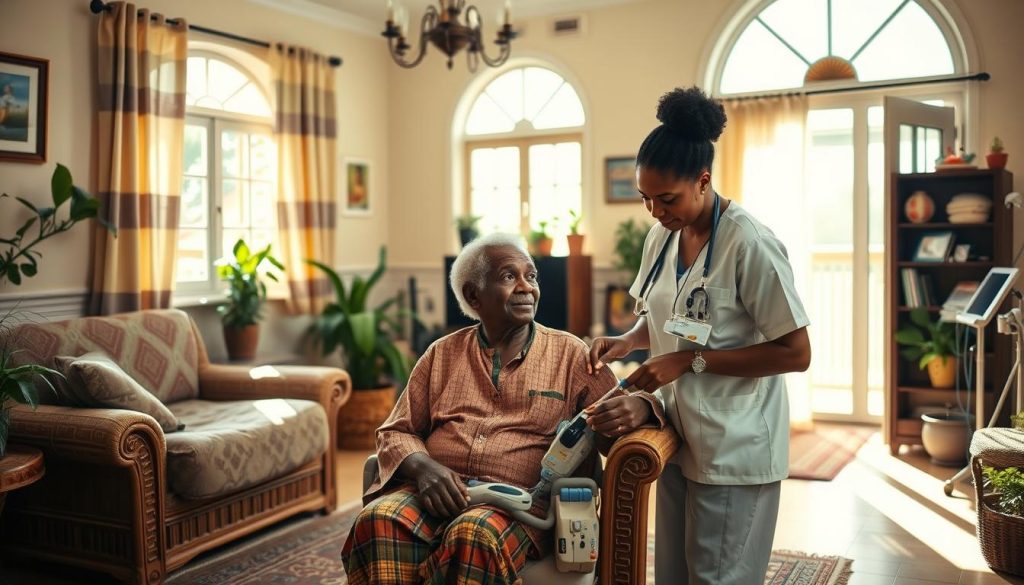
The need for home healthcare in Africa has grown a lot. This is because more people are getting older. Geriatric care faces many challenges, needing new ways to meet the needs of the elderly.
Elderly care services now offer more support. They help seniors stay independent while getting the medical help they need.
Home health aides are key in this change. They help with daily tasks and make sure health and medicine are managed. This helps families and keeps the elderly safe at home.
Telehealth technologies have made healthcare more accessible for the elderly. Seniors can now talk to doctors online. This means they don’t have to travel, and they can get help from home.
As home healthcare grows in Africa, the focus is on creating care that respects seniors. The future of elderly care will depend on working together. Healthcare providers, community groups, and governments need to partner to make sure care is available for everyone.
Health and Wellness Apps: A Growing Trend
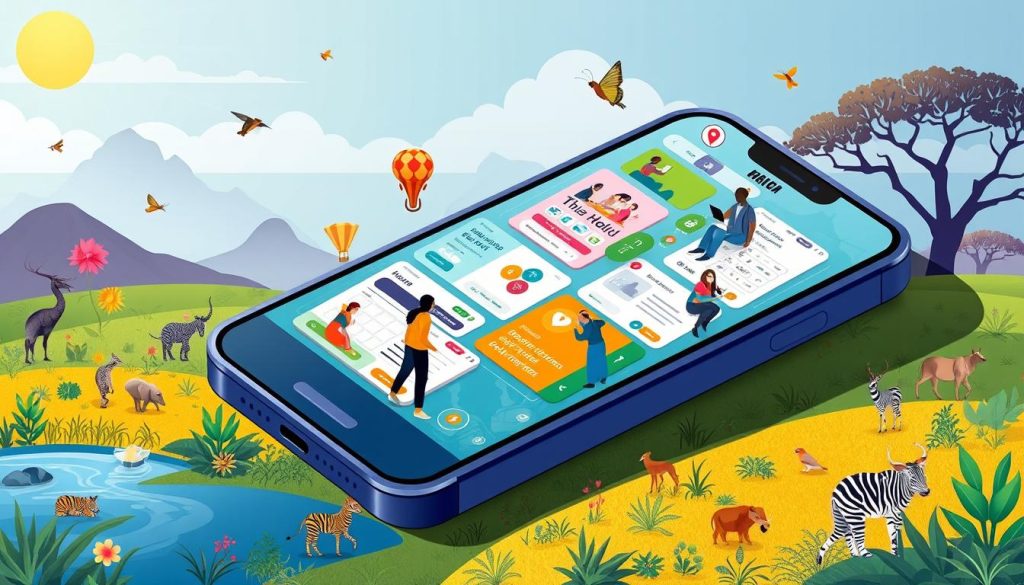
Health and wellness apps are changing the game in Africa. They use technology to help people live healthier lives. This includes both physical health and mental well-being.
There are many different apps out there, each with its own purpose. They help people manage their health in big ways. For example:
- Fitness tracking apps that keep track of workouts and what you eat.
- Mental health apps that offer tips for dealing with stress and staying mindful.
- Telehealth apps that let you talk to doctors from your phone.
More and more people are using these apps. This is leading to a big change in how we think about health. Health apps in Africa are giving users the tools to take control of their health. This shows a growing trend towards taking care of oneself and being responsible for one’s health.
Community Health Initiatives and Grassroots Movements
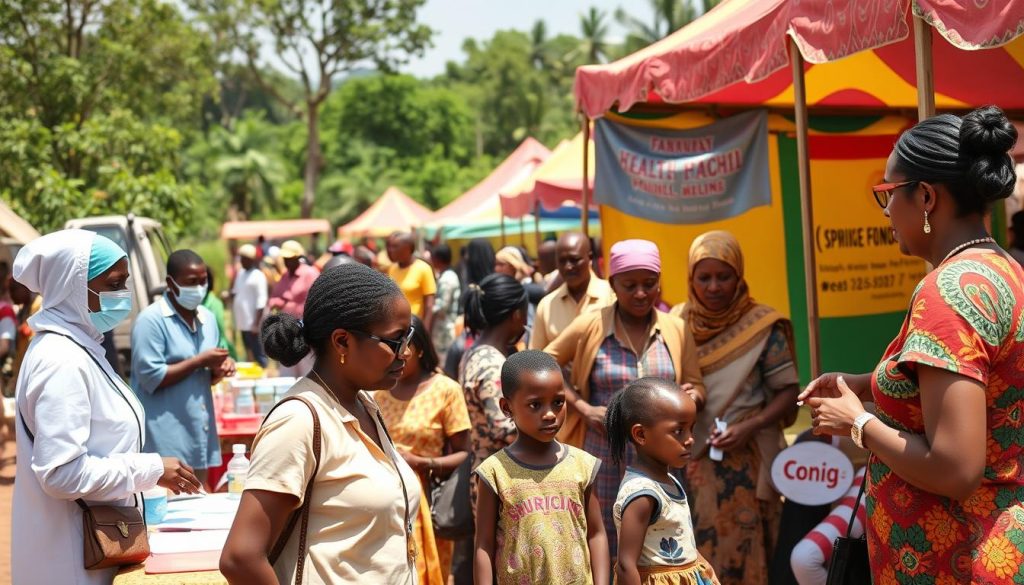
Community health initiatives are key to better public health, especially through grassroots efforts. These projects rely on local involvement, making communities active in their health. Working with NGOs is crucial, bringing in needed resources and skills.
Collaborative Partnerships with NGOs
NGO partnerships are vital for effective community health projects. They provide essential support like funding, training, and advice. Programs focus on:
- Health education and awareness campaigns that empower communities
- Access to essential health services, especially in underserved areas
- Capacity building for local health workers and volunteers
These efforts boost public health engagement, helping communities adopt healthier habits. Yet, keeping the momentum is tough. Issues like funding problems, political shifts, and community support can slow progress. Stronger NGO partnerships are essential to keep these efforts going and improve community health.
The Role of Government and Policy in Healthcare Innovation
The landscape of healthcare innovation in Africa is shaped by government actions and policy. Nations across the continent aim to improve their health systems. The government’s role is key in setting up rules that help investment and innovation in healthcare.
Through strategic reforms, countries can create a space for new healthcare inventions. This is crucial for solving the many challenges in the sector.
Government-led initiatives also encourage public-private partnerships. These partnerships help bring about advanced healthcare solutions. Comprehensive policies can make healthcare more accessible, leading to a healthier Africa.
The relationship between government policy and healthcare innovation is crucial. Clear policies and strategies are essential for a well-integrated system. This system uses innovation to better health outcomes. It’s vital for improving current services and preparing for future challenges.

